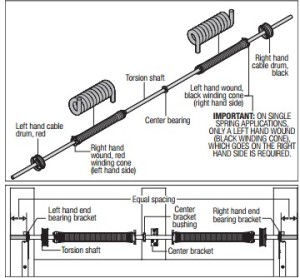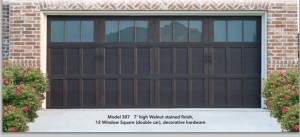Garage doors are heavy. Without springs to help lift them, you or your garage door opener would have to expend significantly more energy to open the door. Two types of springs are commonly used for garage doors:
- Torsion springs are mounted above the door opening.
- Extension springs run down the sides of the garage door
We'll focus on torsion springs and how they work.
Safe and Dangerous
Torsion springs are both safe and dangerous. They are safe because they are set to a shaft, which keeps the springs from flying around the garage should they break. At the same time, it's dangerous for a non-trained person to attempt to maintain torsion springs, because they are under great tension and one false move can cause injury or death. That's why you should always leave torsion spring installation and maintenance to a trained garage door specialist.
Anatomy of a Torsion-Spring Assembly
The torsion spring assembly consists of one or two steel springs, a torsion shaft to which the springs are attached and bearing plates that attach the assembly to the wall above the garage door opening at the center and both ends. The center bearing plate attaches to a stationary cone that caps one end of the spring. The other end is terminated by a winding cone the attaches the spring to the shaft.
The steel torsion shaft has cable drums attached at its ends. The drums hold counterbalancing cables that fasten to roller brackets at the bottom corners of the garage door. Think of the spring as akin to a battery, except it stores mechanical energy instead of chemical energy. You "charge" the spring when you lower the door, which winds the spring and puts it under tension. Raising the door discharges the tension, allowing the springs to work against the force of gravity and help lift the heavy door. The unwinding springs turn the shaft, which turns the cable drums, which reel up the counterbalancing cables and winds them on grooves within the drums. Lowering the door reverses the process.
Ratings
The quality of a torsion spring is indicated by the cycle rating. For example, a regular-duty spring may be rated at 10,000 cycles before it needs replacement. A cycle is one opening plus one closing. If you open your door three times a day, you should get about 7-10 years of life from your properly maintained torsion spring. Companies like Overhead Door Company of Central Jersey use only top-quality springs. The torque available from a torsion spring is a function of its inch pound per turn (IPPT). You can get a high-cycle torsion spring that is rated for a much higher cycle life, with some large springs providing a lifetime of 100,000 cycles.
A torsion spring's lifetime may be shortened for a few reasons:
- Improper Size: The Torsion spring counterbalance on your door was designed to lift a particular weight. If the weight was not correct or additional weight is added to your door after fabrication, then the springs will not be matched properly. Many people think that adding an additional turn to the spring will offset this and to a minor point they are correct, however what this does is change the ‘rate’ of the spring, it now has enough power to lift the full weight of the door when it is closed, but it has too much left when the door is fully open. Also the additional turns usually push a spring past its design life, often shortening the expected life by half or more, a single extra turn can change a 10,000 cycle spring to a 5,000 cycle spring!
- Harsh Environment: Metal components, including steel, do not benefit from high humidity, salty air or temperature extremes. Keeping a torsion spring lightly lubricated can help to mitigate some of the effects of a harsh environment That's why it's important to inspect your door every year -- or have it inspected by a trained professional.
- Poor Maintenance: Springs, bearings and hinges require regular lubrication to obtain maximum longevity. You can perform most maintenance chores, but do not attempt to lubricate the torsion spring unless you are trained how to do so safely.
Many styles of doors sold by Overhead Doors, such as Model 307, are equipped with one or two torsion springs. Your installer will know how to safely handle the springs so that they operate correctly for years to come.
To learn more about what counterbalance choice might be best for your needs, contact us today. Overhead Door Co. of Central Jersey has been selling, installing and servicing quality garage door and opener systems since 1972 – for 47 years – and we are always here to answer your questions. We are conveniently located in Branchburg, NJ at 952 Route 202 South and River Road. We can be reached at (908) 521-4713 or on the web at www.OverheadDoorCo.com.












